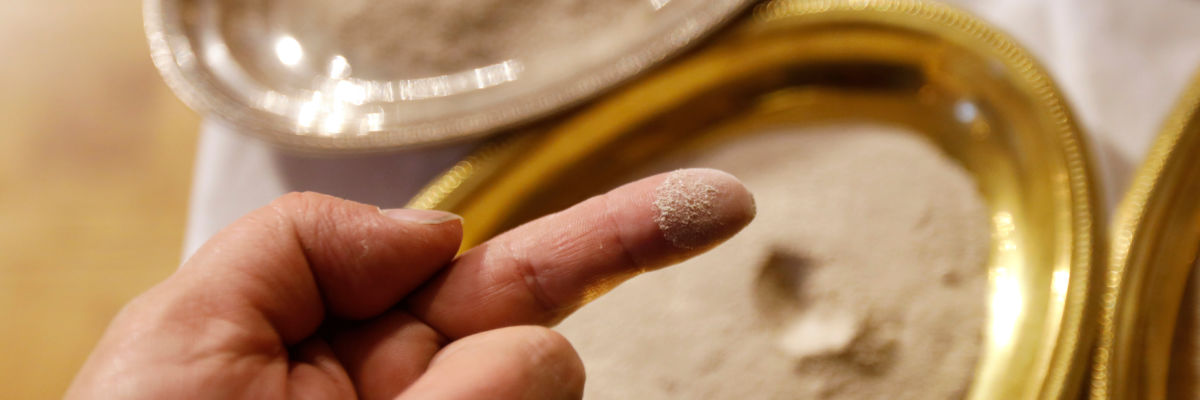
Several years ago, Baptist pastor Robin Anderson decided to meet commuters outside Braddock Road Metro Station in Alexandria, Virginia for Ash Wednesday. The reverend offered passersby “glitter ashes,” representing “inclusion” for certain people in Christian life. Rev. Marian Edmonds-Allen, the inventor of glitter ashes, consulted several Protestant theologians, who told her that mixing ashes with glitter is not sacrilegious.
The concept of “glitter ashes” may not seem in keeping with the penitent tenor of Ash Wednesday—nor its message harmonious with biblical and ecclesial injunctions—but the reverends’ participation in the holy day is hardly unique among Protestants. Indeed, various branches of Lutheranism, Presbyterianism, Anglicanism, and Methodism, among other Protestant denominations, celebrate Ash Wednesday. Most of them, to my knowledge, forgo the glitter.
In my former conservative, traditionalist Presbyterian denomination, the thought of holding an Ash Wednesday service would have been anathema because of what is called the regulative principle of worship. That is the belief that the only things allowed in public worship are those things explicitly described in Scripture, such as singing, praying, reading of Scripture, preaching, and communion. Everything else, such as non-Sunday liturgical services that might include ashes, holy water, venerating icons or crosses, or Eucharistic adoration, was prohibited.
But apart from strict Reformed congregations, many Protestant churches have celebrated Ash Wednesday since the early days of the Reformation. The Church of England, for example, continued to perform Ash Wednesday services—the Ten Articles of Henry VIII, for example, expressly commended the “giving of ashes on Ash-Wednesday.” Calvinist-leaning Anglican hardliners such as Thomas Cranmer disapproved of the ashes, and the practice eventually was largely discontinued. The Episcopal Church in the United States, however, revived the holy day, “as a day of fasting and humiliation, wherein we are publicly to confess our sins, meekly to implore God’s mercy and forgiveness, and humbly to intercede for the continuance of his favor.”
In the twentieth century, as many denominations dispensed with their most explicit anti-Catholic opinions, Ash Wednesday made a comeback in Protestantism. Part of the explanation for this is what is called the Liturgical Movement, a nineteenth- and twentieth-century effort among various Protestants (and Catholics) to reform worship by incorporating more ancient liturgical practices. The Liturgical Movement, explains Princeton University professor Horton M. Davies, “enabled Protestant churches to recover in part the Catholic liturgical heritage.”
Similar to Catholics, a spirit of repentance underlies Protestant Ash Wednesday services. Indeed, Anglicans, Methodists, and Lutherans explicitly encourage their members to engage in various forms of fasting, just as Catholics do on the holiday. All of this is a means of commencing the Lenten season as a special time of prayer, fasting, and repentance for sins.
Catholics can certainly welcome Protestant practices that align with our own liturgical traditions, and Ash Wednesday is no exception. Indeed, Ash Wednesday is widely considered one of the most highly attended days of the year for the Catholic Church, and that is in part because many Protestants attend and participate in Catholic Ash Wednesday services. The ashes, unlike the Eucharist or absolution in the sacrament of reconciliation, are something any person, regardless of religious affiliation, is allowed to receive from a Catholic priest. And it’s possible that Ash Wednesday can serve as a stepping stone in the journey to the Catholic Church.
That said, renewed popularity in Ash Wednesday among Protestants can also reflect what my friend and fellow convert Bryan Cross calls “ecclesial consumerism”: the idea that church participation and religious observance are akin to other consumerist tendencies and fundamentally based on subjective, personal preference. Perhaps people enjoy the feeling of participating in something traditional and historic. Or they like special days and doing something that sets them apart, such as ashes placed conspicuously on the forehead for all to see.
I’d also argue that participating in such rites as Ash Wednesday can create a veneer of liturgical traditionalism that can persuade Protestants that they do not need to convert to Catholicism, because they can find the same “smells and bells” within their own Protestant tradition. Indeed, I know some low-church evangelicals who have thoroughly embraced various ancient Church practices, liturgical seasons, and other religious rituals, all in an attempt to form a spiritually richer, tradition-honoring Christianity. In a certain sense, that could be a noble enterprise, though it would also be both ad hoc, in that the individual Christian is the one deciding which traditions and rituals to accept. It’s also an imperfect, incomplete substitute for the real thing that might deceive its practitioners into a certain intellectual complacency.
Moreover, as St. John Henry Newman argued, Protestantism is a religious system predicated on private judgment—meaning that Protestant Ash Wednesday will always be susceptible to the same personal predilections and peccadilloes that have brought about the theological and ecclesial chaos and confusion that so defines twenty-first century Protestantism. Thus the glitter ashes phenomenon: If the Bible means whatever I say it means, then why not glitter in our ashes? Perhaps this Lent we need to repent of archaic and oppressive religious beliefs!
Similar to so many other doctrines and practices that we share with our Protestant brothers and sisters, Catholics should interpret Protestant celebrations of Ash Wednesday as an opportunity. It is an opportunity to share a common religious practice and belief, yes. But it is also an opportunity to discuss our differences: over what constitutes sin, over how to best repent of our sins and defeat them, and what it means to be fully reconciled to our risen Lord. For ashes on the forehead is only the first step of our Lenten journey, one that also must include reconciliation with Christ and his Church, and communion with Christ in the Eucharist.
That is something only the Catholic Church can offer in its beautiful fullness. Sans glitter.



